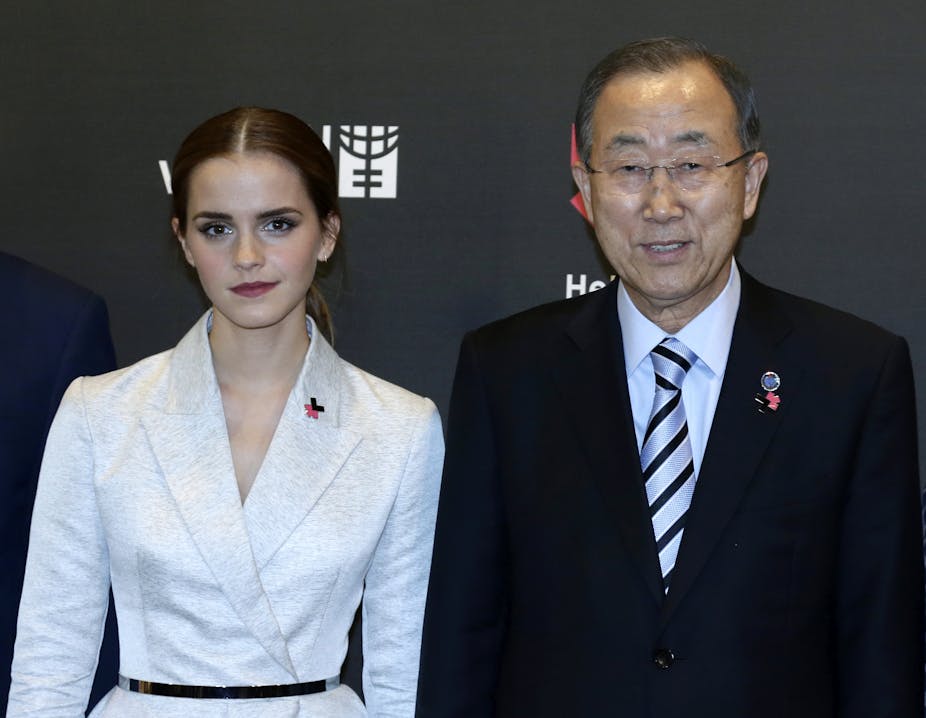I never really “got” the Harry Potter phenomenon, but I did see that, as my daughter grew up, she found in the character of Hermione Granger a spirited role model. Hermione was vocal, and unafraid of calling out sexism where she saw it. Here she is in Harry Potter and the Goblet of Fire, upbraiding her friend Ron Weasley for his casual sexism:
‘We should get a move on, you know … ask someone. He’s right. We don’t want to end up with a pair of trolls.’
Hermione let out a splutter of indignation. ‘A pair of … what, excuse me?’
‘Well – you know,’ said Ron, shrugging, ‘I’d rather go alone than with – with Eloise Midgeon, say.’
‘Her acne’s loads better lately – and she’s really nice!’
‘Her nose is off-centre,’ said Ron.
‘Oh, I see,’ Hermione said, bristling. ‘So basically, you’re going to take the best-looking girl who’ll have you, even if she’s completely horrible?’
‘Er – yeah, that sounds about right,’ said Ron.
‘I’m going to bed,’ Hermione snapped.
The recent decision of the actor best-known for playing Hermione in the Potter film franchise, Emma Watson, to speak at the UN about feminism makes perfect sense. At the UN, Watson came across as an articulate, passionate, even Hermione-like speaker, cannily employing her public profile to garner attention for the hitherto broadly unpopular idea of capital-“f” Feminism.
A turning point?
But that lack of popular enthusiasm for Feminism is undergoing quite a metamorphosis. High-profile women speaking out and self-identifying as “feminists” is now de rigueur. (And it’s a far more potent and useful trend than, say, artfully-ripped denim.)
Facebook CEO Sheryl Sandberg has urged us to “lean in”; Angelina Jolie has been vocal in her condemnation of Female Genital Mutilation (FGM); and Beyoncé’s pithy essay “Gender Equality is a Myth”, co-opts men, who:
Have to demand that their wives, daughters, mothers, and sisters earn more – commensurate with their qualifications and not their gender.
Speaking out like this has always been fraught for women. We only need to look at the hoax 4chan “threats” to humiliate Watson to see that this is the case. I’ve already written about how recent 4chan leaks were designed to shut up autonomous women by shaming them. Yet high-profile women continue to speak up for women: even a bullet could not stop the astonishing Malala Yousafzai.
Watson’s UN speech is as witty and humane as anything Hermione might have articulated. Like Beyoncé, Watson also focused on the role that men should play in the fight for gender equality. She emphasised the idea of “HeForShe”, a slogan which was rapidly – and, I’d argue, sometimes vapidly – shared across social networking sites. It’s easy to tweet a selfie, holding a piece of paper with #HeForShe written on it. It’s far harder to be an activist.
As well as expressing an anti-separatist stance on gender equality, Watson also explicitly acknowledged her own “sheer privilege”:
My parents didn’t love me less because I was born a daughter. My school did not limit me because I was a girl.
Predictably, her speech has been simultaneously celebrated and reviled in the days since. But it isn’t only men who deride her: her words have given rise to the by-now familiar backlash against “celebrity feminism”, and to tributary debates around whether Watson, Sandberg, or Beyoncé – Mrs Carter – are “real” feminists.
Goodbye to gatekeepers
Who the gatekeepers of “real” feminism are is too complex a debate to enter in to here, but suffice it to say that “feminism” as a singular entity has been stretched almost to breaking point. Feminisms are complex and multivalent, manifesting in increasingly diverse ways, each as threatening to patriarchy as the next.
The points of intersection of class, ethnicity, gender, and feminism complicate “feminisms” still further. What matters is that Watson is using her (white, wealthy, heteronormative, able-bodied) position for good, and, far from pulling up the ladder of opportunity behind her, is instead signposting it for young women – and men – everywhere.
If some aspects of the behaviour or identity politics of “celebrity feminists” displease us, perhaps because of their outspoken and ultimately anti-separatist plea for the involvement of men and boys in feminism, we risk being antifeminist ourselves. When this happens, patriarchy’s work is being done for it, and it doesn’t even need to get in the game.
Choice is the keystone of feminist thought, and so women like Watson must be able to define themselves as “feminist”, which Watson terms an “uncomfortable word”. Watson and Beyoncé are both feminists even if they don’t pass our own, personal, imaginary little feminist tests.
Further, however galling it might be, we also need to “allow” women to say they’re not feminists – the point is the choice to self-define (albeit that those Women Against Feminism do exhibit symptoms of a highly contradictory and ill-informed patriarchal Stockholm Syndrome).
Watson’s speech has – happily – challenged its listeners. The celebrity who acknowledges her privilege, who forgoes snorting coke off the tanned, shaven torsos of male models in a dimly-lit suite in the Chateau Marmont, instead making a stand and raising public consciousness about life-and-death issues, is absolutely one with a voice to be heeded.
But we need to ensure that #HeForShe lasts, and doesn’t just end up being an autumnal variety of this summer’s ice-bucket challenge. After all, this Twitter “activism” can even be done without getting cold. It’s very easy to raise consciousness via Facebook, Tumblr, and Twitter, but to make that raised consciousness stick and have real, long-term impact, is going to take much more. One UN speech isn’t enough, but it’s a damned good place to start.

